How to tune up a lawn mower video
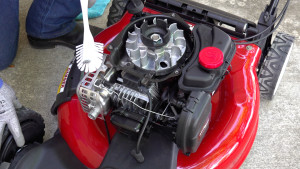

You can help the engine on your walk-behind lawn mower run better and last longer by giving it a tune-up at least once a year. A tune-up takes about half an hour and involves changing the oil, air filter and spark plug, along with cleaning the exhaust, controls and engine cooling system. This video walks you through the process so you can keep your engine performing its best.
For additional repair help, including common symptoms and troubleshooting tips, step-by-step lawn mower repair guides and articles, check out our repair help section. In addition, find the lawn mower parts you need to fix your mower.
Hi, Wayne here from Sears PartsDirect. Did you know that tuning up the engine on your lawn mower at least once a year helps it last longer and perform better? It doesn’t take that long either—we’ll show you how in this video.
Supplies you may need
Oil
Drain pan
Air filter
Spark plug
Spark plug wrench
Spark plug gap tool
Feeler gauge
Wrench or nut driver set
Plastic bag
Shop rags
Cleaning brush
Work gloves
Safety goggles
Compressed air supply (optional)
When buying supplies, make sure to get the spark plug and air filter that fit your engine. You also need motor oil, a drain pan, a spark plug wrench, a wrench or nut driver set, shop rags, a cleaning brush, work gloves and safety goggles.
Before you begin
Look up the engine oil capacity in the engine owner's manual so you know how much to add when changing the oil.
In a well-ventilated area, check fuel level in the gas tank. The tank should be nearly empty before starting the tune-up so fuel doesn't spill when you tip the mower.
If the tank has fuel, run the mower to empty most of the fuel or drain most of it out of the tank.
Just before beginning the oil change, run the engine for 5 minutes to warm the oil so it drains faster. If you ran the engine to empty the fuel tank, let the engine cool for about 20 minutes. The oil will still be warm enough.
Put the mower on a level surface.
Wearing safety goggles and work gloves, remove the fuel tank cap. Place a plastic bag over the fuel tank opening and put the fuel tank cap back on to prevent gasoline from leaking out through the fuel tank cap vent.
Remove the spark plug wire; be careful because the engine is hot.
Change the oil
Remove the dipstick and wipe it clean with a shop rag.
Put the drain pan next to the mower.
Tip the mower to drain the oil from the dipstick tube and into the drain pan.
After the oil drains, set the mower upright and wipe up any spilled oil.
Carefully pour new oil into the dipstick tube. Start by pouring in three quarters of the amount of your engine’s oil capacity, because some oil might be left in the mower.
Wait a minute for the oil to settle in the engine sump.
To check the oil level, push the dipstick all the way into the dipstick opening and lock it.
Then unlock and pull out the dipstick. If the oil doesn’t reach the top of the full mark on the dipstick, add a little more oil, wait a minute and check again.
Repeat until oil reaches the top of the full mark. Reinsert the dipstick.
Take off the fuel tank cap, remove the plastic bag and reinstall the cap.
Replace the air filter and change the spark plug
Next, we'll change the air filter. Release the locking tab and pull off the air filter cover. Remove the old air filter and install the new filter. Reinstall the air filter cover.
To replace the spark plug, use a spark plug wrench to remove the old plug from the engine cylinder. Using a gap tool and feeler gauge, set the gap on the new spark plug to the specifications in your engine owner’s manual. For this engine, the gap is 0.02 inches. Thread the new spark plug into the engine and tighten it with the wrench. Don’t reconnect the spark plug wire yet.
Clean the engine
The next step is to clean the engine when the engine and muffler are completely cool. Release the starter rope from the lawn mower handle. Remove the screws from the blower housing and pull the housing off the engine.
Clean the muffler and engine cooling fins using the cleaning brush and shop rags. Also clean the choke and throttle rods, springs and linkages. Use the brush to remove debris from the rewind starter grill.
You can also blow debris and dirt off the engine and controls using compressed air.
When you’re done, reinstall the blower housing and connect the spark plug wire.
Re-check the oil level
Now that we have everything installed, let’s start the engine and re-check the oil level. In a well-ventilated area, run the engine for a few minutes to move the oil through the engine. Then shut the mower off. Allow a minute for the oil to settle in the engine sump. Remove the dipstick and check oil level.
Add oil if needed to hit the full mark on the dipstick.
That’s it, the tune-up’s complete and you’re ready to start another season of mowing.
I hope this video helps you out today. You can find links to the parts and products we talked about in the video description below. Check out our other videos here on the Sears PartsDirect YouTube channel. Subscribe, and we’ll let you know when we post new videos.
Symptoms for gas walk-behind mowers
Choose a symptom to see related walk-behind mower repairs.
Main causes: drive control cable failure, worn or broken drive belt, bad transmission, broken drive wheel…
Main causes: engine needs tune up, dirty or clogged carburetor, damaged flywheel key…
Main causes: dirty carburetor, bad spark plug, clogged air filter, engine choke problems, clogged gas cap vent…
Main causes: damaged cutting blade, loose cutting blade, damaged flywheel key, engine needs tune up…
Main causes: stale gas, engine needs tune up, bad spark plug, dead battery, bad recoil starter, faulty safety switch, ba…
Main causes: uneven wheel height settings, damaged wheel, dull or damaged cutting blade…
Repair guides for gas walk-behind mowers
These step-by-step repair guides will help you safely fix what’s broken on your walk-behind lawn mower.
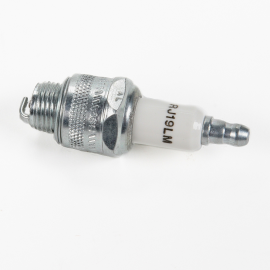
How to replace a lawn mower spark plug
Take a few minutes to replace the spark plug during your lawn mower's annual tune-up or if the spark plug is burnt or cr…
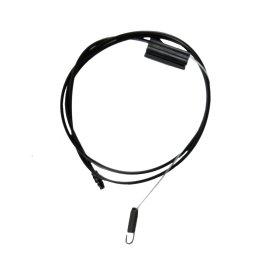
How to replace a lawn mower drive cable
The drive cable engages the transmission to spin the drive wheels and move the mower across the grass. Replace the drive…
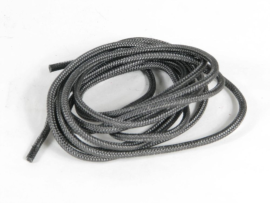
How to replace a lawn mower starter rope
These step-by-step instructions show how to replace a broken starter pull rope on a walk-behind lawn mower.…
Articles and videos for gas walk-behind mowers
Use the advice and tips in these articles and videos to get the most out of your walk-behind lawn mower.

Learn about all the convenient features on our Sears PartsDirect website that make your parts purchases easier.…
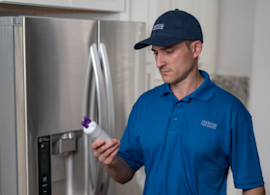
Get answers to frequently asked questions about Sears and Sears PartsDirect.…

Find out how to test and fix problems with the spark plug, stop wire, ignition coil and flywheel.…